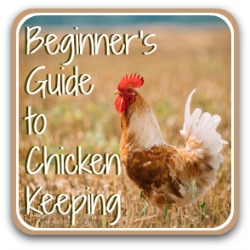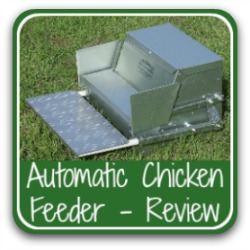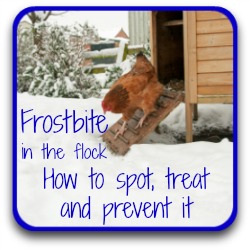Fly strike: what it is and how to deal with it.
Flies are one of the biggest problems chicken-keepers face in the summer months.
They can bring not only disease to the chicken coop, but also one of the deadliest conditions to affect chickens. A condition that happens quickly, often without warning, and kills if not treated.
Fly strike.
In this article we'll examine what it is, why it happens and how it should be managed.
And to understand that, it's critically important to look at some information about flies in general.
So we'll start there.
How long do flies live, where do they come from and how do they reproduce?
The average house fly (musca domestica) can live for up to 28 days - not long, you might think.
Except that during that time, they reproduce by laying at least five or six batches of eggs, each containing between 75 and 150 eggs(1).
So, potentially almost a thousand eggs from just one fly. And the eggs hatch within between just eight and twelve hours.
Which is why they need to be stopped quickly. One fly can very quickly become an infestation.
Where do flies lay eggs?
There are four stages in a fly's life cycle: egg, larva, pupa and adult(2).
In order for the eggs to hatch, they must remain warm and moist. So the fly will lay on any surface which is damp to the touch. They're particularly fond of decaying matter, so they'll use garbage, manure, compost, and any kind of animal waste.
They also love moist food.
So a fly which has been on animal poop a few minutes ago will have no problem about depositing bacteria and laying its eggs on your unrefrigerated food.
Or on your chickens.
Do house flies bite?
Contrary to what you'll see on some websites, house flies do not bite. Horse flies and deer flies do, but not house flies.
A house fly transmits disease in a different way.
While it's there laying its eggs, pathogens (diseased matter) from the original source - let's say your fly had been on some dog poop - will be regurgitated or excreted from the fly onto your food. Or your chickens.
The diseases it spreads has been proven to range from dysentry and cholera in humans to Newcastle disease, E.coli and salmonella in chickens(2, 3, 4).
Which is why, even though it doesn't bite, the common fly is no good either for you or for your flock.
Flystrike in chickens: how flies can kill poultry.
Please note: this is not a pleasant description. But it's vital you know what's happening and what to do if your chickens are to be kept safe.
We've seen that flies like warm, humid conditions to lay eggs and the eggs need those conditions to turn first into a larva (the maggot), then become a pupa, which finally hatches as another fly.

What better place than a chicken coop in the summer. Warm bedding, particularly if it's kept moist by spilled water, rain or droppings, is an ideal place to lay their eggs.
But that's by no means the worst of it.
Fly strike (myiasis): what is it?
Please note: This page is written as general information only. It is not intended as medical or veterinary advice and should not be taken as such.
If you're worried about your chickens' health, you should always see your veterinarian.
Here's what happens...
- A fly (or flies) find a chicken's vent area an ideal place to lay eggs. Warm, dark and moist - and better still if it's dirty. Flies like dirty.
- The eggs, laid into the feathers, hatch into maggots within eight to twelve hours. And remember: each fly lays up to 150 eggs. That's a lot of maggots.
- The maggots need food. Chicken flesh is food. So the maggots burrow into and feed on the chicken's vent area. Do I need to say more?
- This is not only an incredibly painful experience for the chicken - it can be fatal. It needs to be dealt with as an emergency.

Can fly strike affect humans?
It can happen in rural, tropical regions and it's not unknown in war when wounds go untreated. Other than that, flystrike in humans would be very unusual these days.
It is, though, a common affliction in other mammals, particularly horses, rabbits and sheep.
Fly strike treatment.
Links in this section are "affiliate links", which means that if you click and buy something, I earn a small commission at no extra cost to you.
- Inspect your chickens' vents regularly, especially in the summer.
- Immediately you see any sign of maggots or eggs (which are tiny, so far harder to spot), take action.
- Run a warm bath in a bowl large enough to fit the chicken. Submerge her up to the top of the vent - or beyond, if the wound is larger.
- Have a good pair of tweezers to hand in your poultry first aid kit.
- Using the tweezers, remove as many maggots as you can see. Yes, it's gross. Really, really gross. But it's the only way.
- When you've got as many as you can see, clean the area with a saline solution and then dry with a warm hairdryer. If feathers are in the way and may keep the area moist, cut them off. They'll grow back and the area needs to be as clear as possible to prevent a re-infestation.
- When dry, spray with Vetericyn - again, you should have some in your first aid kit.
- If there's an open wound, put the affected chicken(s) into isolation until it's healed.
- Repeat the process at least twice a day for several days, to make sure all the eggs have hatched and the maggots are gone.
Fly strike: how to prevent it.
As with any health related problem, prevention is far better than cure – and fly strike cannot always be cured.
Given that it's caused by flies, the obvious way of preventing it is to get rid of flies from your coop.
This article discusses the pros and cons of fourteen different and complementary ways of preventing fly strike in chickens.
Don't wait until fly strike strikes. Act now.
More articles to help keep your chickens safe.
Sources.
A lot of "facts" you'll find on the internet are often people's individual views, based on inaccurate information repeated from poor quality sources.
The information I provide in this article and others is based not just on my own experience, but on evidenced facts from scientific, peer-reviewed research and books from highly respected and experienced poultry keepers such as Gail Damerow.
Some of the trusted sources I have used in this article are these.
1. Rentokil: Flies. Updated annually.
2. Sanchez-Arroyo, H., and Capinera, J. L.: The House Fly. Pub. University of Florida, Department of Entomology and Nematology.
3. British Hen Welfare Trust: Fly Strike.
4. Loftin, K. L, et al: Biology and Control of Flies in Poultry Facilities. Pub. University of Arkansas, Department of Agriculture.
















